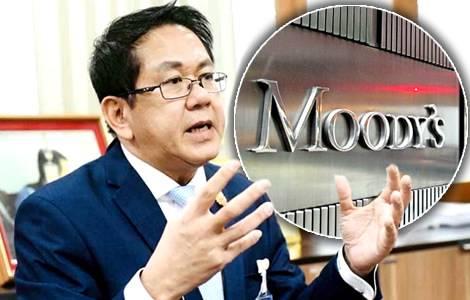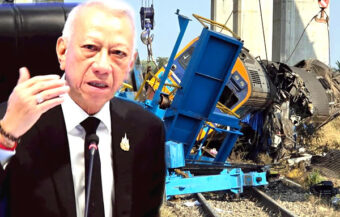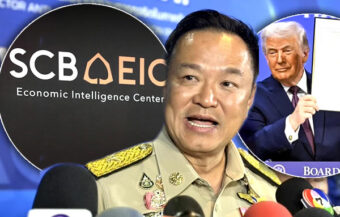Thai officials slam Moody’s ‘negative’ outlook as premature, pin hopes on May trade talks with US. Ministers dismiss outlook downgrade as premature, tout baht strength and reserves as buffers amid tariff threats and quake fallout. Trade talks and stimulus plans are seen as key to economic rebound in late 2025.
Despite an outlook downgrade by credit rating agency Moody’s on Tuesday, senior Thai officials and a minister with the government on Wednesday came out fighting. For instance, Minister of Commerce official Pichai Naripthaphan stated that the ratings agency had it wrong. He said that talks with the United States were due to start in May and was hopeful of an optimistic outcome. At the same time, Prime Minister Paetongtarn’s advisor and spokesman Jirayu Huangsap insisted that the Thai economy would grow by 2% this year and pointed to the investment-grade Baa1 status. These comments were sharply in contrast with business leaders and opposition figures who said the Moody’s note was a warning to Thailand.

Moody’s, the credit rating agency, downgraded the outlook for Thailand on Tuesday from stable to negative. The call from Moody’s maintains the kingdom’s Baa1 credit rating. This signifies it as the highest tier of the medium level in the agency’s index. Essentially, this indicates that Thailand’s debt is investment grade with a particularly good standing.
However, the downgrade reflects increasing risks that Thailand’s economic and fiscal resilience could erode if external pressures intensify. The decision comes as Thailand lags behind other Southeast Asian countries in engaging with the United States on trade negotiations. Notably, US tariff threats on Tuesday were the key reason for the downgrade.
Thailand’s delays in trade talks with the US and strategic drift expose the economy to steep tariff risk
Thailand presently faces the possibility of a steep 36% tariff by the US, its top export partner, unless talks make progress soon. On Wednesday, Thailand’s Minister of Commerce and a key negotiating team member suggested that talks may begin in May 2025.
Certainly, this sees the country well behind both Vietnam and Indonesia in the scramble to secure a deal with the United States.
Indeed, there is confusion about Thailand’s strategy in dealing with the tariff crisis. Certainly, more than once, Thai ministers, including Prime Minister Paetongtarn Shinawatra, have suggested that the United States may itself alter the tariff regime.
Certainly on Tuesday, Prime Minister Paetongtarn even suggested a collective negotiating strategy with the ASEAN bloc. In brief, Thailand is thought to be under pressure from China in this process.
Last week, Beijing threatened regional players with stiff retaliation for ‘pleasing’ the United States at its expense.
Thailand’s ageing population and industrial decline contribute to downgraded growth expectations
Additionally, the ratings agency noted the ongoing struggle Thailand’s economy has faced since the pandemic. Many elderly Thais and self-employed operators were sidelined during the crisis and have not returned to employment. Meanwhile, the kingdom faces a rapidly ageing population and an increasingly outdated manufacturing base.
“This shock exacerbates Thailand’s already sluggish economic recovery post-coronavirus pandemic, and risks aggravating the trend decline in the country’s potential growth,” Moody’s said.
Meanwhile, Thailand’s central bank has now slashed its growth forecast for 2025 from 2.5% to just 2%. Furthermore, the central bank said this is the best-case outcome. Some analysts warn it could dip to 1.3%.
In addition to the threatened 36% tariff measure from the United States, Thailand suffered tremors—particularly in Bangkok—on March 28th from an earthquake in Burma. This has shaken confidence in the property sector and foreign tourism.
Tourism slump and quake fallout compound pressure as Bank of Thailand slashes interest rates again
That quake, measuring 7.7 in magnitude, killed scores of people and damaged infrastructure, especially in Bangkok. The sight of a collapsing 30-storey tower under construction was aired all over the world on March 28.
On Wednesday, the Monetary Policy Committee of the Bank of Thailand lowered the borrowing rate to 1.75%. The 25 basis points cut comes after a similar cut in February.
Previously, in February, the central bank indicated caution in further rate reductions. However recent circumstances have significantly darkened the economic outlook further. Five of the seven committee members voted in favour of the cut, marking the lowest rate in two years.
At the same time, Thailand’s foreign tourism numbers are underperforming compared to figures seen in 2024. However, there was a bump of 17.8% in exports for March 2025, the highest level seen in three years. The higher-than-expected output figures also helped to stabilise the declining manufacturing index.
Surge in export orders before US deadline lifts March output but offers only short-term support
On Wednesday, the Office of Industrial Economics (OIE) revealed a 0.66% decline for March, in contrast to a Reuters’ polls suggesting 2.35%.
Significantly, these gains were due to a surge in orders to beat President Trump’s tariff introduction on April 9th. Notably, there is a loophole where goods certified as “in transit” are exempt once they arrive in America by May 27th. Exporters are scrambling to meet the ‘in-transit’ threshold to avoid penalties under Trump’s trade measures.
Indeed, this latter date is a key deadline. Consequently, Thai planners anticipate a depressed world market, particularly affecting Thai exports in the latter half of 2025.
On Wednesday, Minister of Commerce Pichai Naripthaphan criticised Moody’s call. The minister held out hope that Thai exports would grow by 2-3% for the present year, a particularly optimistic view. Nonetheless, Mr. Pichai insisted that Moody’s decision jumped the gun.
“I think Moody’s is not seeing the big picture. Moody’s needs to look at its own forecasts and see if what it has done is working. If it assesses Thailand’s rating based on the retaliatory tariff rate that the US is expected to impose at 36%, it will have to downgrade other countries, such as Vietnam,” he said.
Currency strength and deep reserves seen as buffers as officials downplay Moody’s downgrade call
Finance Minister Pichai Chunhavajira has also said Thailand would address US concerns on currency manipulation and origin fraud. Meanwhile, the Thai baht has gained 11% this year because of the country’s reserves and safe haven status.
In the medium term, it may decline as the Trump tariff regime impacts export orders. However, analysts still believe it will recover as usual towards the end of the year.
Significantly, it has strengthened 3.8% alone since April 7th. Then it was valued at ฿34.70, in contrast to ฿33.28 to the dollar on Wednesday.
Certainly, it should be noted that Thailand maintains a strong investment grade credit status, supported by $246.9 billion in external reserves, including gold as of March 2024. These reserves, among the highest in Asia, have helped cushion recent shocks and stabilise the baht.
Despite the kingdom’s chronic structural problems and a debt overwhelmed private sector feeding into the public sector, it has strong financial underpinnings.
Domestic critics and IMF warn of rising debt as confidence in economic leadership is questioned
Thailand’s Baa1 status is compared to Vietnam’s lower investment grade status. Moody’s Ba2 rating for Vietnam underlines Thailand’s relative economic strength despite its current challenges.
However, on Wednesday, there were voices of concern in in the kingdom. Palang Pracharat Party deputy leader and former Minister of Finance in the government of Yingluck Shinawatra, Thirachai Phuvanatnaranubala, was critical.
He cited this as a sign of a lack of faith in the government’s ability to manage the economy. Mr. Thirachai claimed the downgrade signalled international distrust in the current government’s economic management strategy.
Last week, senior International Monetary Fund (IMF) figures also expressed concerns about the government’s plans to increase public sector borrowing, currently at 64.4%. Talks are underway to raise the debt ceiling stipulated by the State Fiscal and Financial Disciplines Act 2018, currently set at 70% of GDP. IMF officials warned that breaching this ceiling could erode investor confidence and trigger bond market volatility.
The government is planning a stimulus package of ฿500 billion to support the economy later this year. The policy will focus on four areas: consumption, public spending, trade, and both public and private investment.
Government pushes stimulus and trade pivot as private sector fears investment decline and rating cut
Also on Wednesday, business figures such as Mr. Poj Aramwattananon, President of the Thai Chamber of Commerce, expressed unease. Mr. Poj particularly viewed this as a warning from the international financial markets. He said the downgrade may deter new foreign direct investment and damage long-term capital inflows.
Indeed, some financial industry analysts have forecasted a drop in the credit rating by one notch. Such an occurrence would put pressure on Thai bond yields and consequently the cost of servicing Thailand’s public sector debt. SCB Economic Intelligence Center forecasts two more rate cuts this year, bringing the rate down to 1.25% by year-end.
Bank of Thailand Governor Sethaput Suthiwartnarueput described the tariff conflict as a “gathering storm” demanding policy focus on stability. In the meantime, Mr Jirayu Huangsap, a close advisor to Prime Minister Paetongtarn Shinawatra was critical of the Moodys decision. He particularly noted that came while trade talks with the US are ongoing and not yet concluded.
Mr Jirayu proposed that the final tariff rate could be lower than expected, which may prompt Moody’s to reassess its downgrade. He called Moody’s move premature and unbalanced. He noted over a hundred rating firms exist worldwide, many of which are issuing similar warnings due to US trade action.
Officials claim rebound possible by year-end. Downgrade seen as premature and criticism as politically driven
Thailand’s baht, though pressured by weak tourism and exports, remains one of the region’s strongest currencies year-on-year. SCB Financial Markets on Wednesday said it expects short-term baht weakness. Nonetheless, it predicts medium-term strengthening due to falling oil prices and rising gold.
Central bank to lower rates as Thailand prepares for tariff crisis as it decides between US and China
Thaksin announces a change in trade and industrial policy. Sounded much like a pivot towards the United States
China warns Thailand not to ‘please’ the United States at its expense. US trade talks again postponed
Mr. Jirayu in particular asked critics like Mr. Thirachai to temper political attacks during this sensitive period of turbulence. He stressed that 2025 GDP growth, although revised down to 2%, is still positive — unlike projections in some neighbouring economies.
Thailand’s government insists that the downgrade does not reflect the full economic picture and is preparing further stimulus. In contrast to most analysts, top officials insist the headwinds ahead will recede as US tariff talks progress. Indeed these senior officials insist a rebound is likely in the second half of 2025.
Join the Thai News forum, follow Thai Examiner on Facebook here
Receive all our stories as they come out on Telegram here
Follow Thai Examiner here
Further reading:
Thaksin does not rule out joining talks in US as Thai team finalises plans. They fly out on Thursday
Trump’s remaking of World trade, if it works, will force Thailand to decide between the US and China
US offers a 90-day tariff pause but Thailand must move faster as it already faces shaved GDP in 2025
PM addresses the nation in shock over last week’s earthquake and this week’s Trump tariff bombshell


















